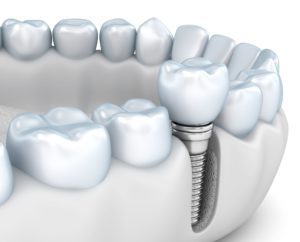Millions of adults suffer from tooth loss and deal with functional and aesthetic consequences. But without tooth replacement treatment from your dentist, you might also see a further decline in your oral health, including for your jawbone.
Whether you want to replace one, several, or a full arch of lost teeth, implant dentistry offers a long-lasting and comprehensive solution to restore your smile. And unlike other treatments, implants can preserve your jawbone. Read on to discover the impact that missing teeth hold on your jaw health and how dental implants can help.

How Do Missing Teeth Affect the Jawbone?
Healthy dental patients have a full set of teeth, each with a root that extends below the gumline to the jaw. The tooth root serves as a stimulus to the bone there, ensuring the jaw remains strong and stable.
When you lose one or more teeth, the jaw no longer receives this stimulation. In its absence, the jawbone begins to deteriorate. This can result in a sagging look in the face, the shifting of teeth out of their straight position, and other oral health complications.
You cannot stop this impact from tooth loss on your own. But you can talk to your dentist about ways to replace missing teeth that can also address this problem with the jaw. Schedule a dental consultation today to learn more.
Can Dental Implants Protect My Jaw?
A dental implant involves a titanium post anchor that a dentist surgically inserts into the jaw. It fuses with the bone there in order to become a strong support for the prosthetic teeth of the implant.
This anchor will also serve as a replacement for the missing tooth root, providing stimulation to the jawbone once again. This stops the bone from deteriorating. In some cases, it can encourage degenerated bone to regrow.
Other tooth replacement treatments, like removable dentures, can fill gaps in your smile and improve oral capabilities. But they do not treat tooth loss below the gumline, which means they cannot prevent jawbone deterioration. Ask your dentist if you qualify for maximum restorative benefits from implant dentistry.
Am I Eligible for Implant Dentistry Treatment?
The advantages of replacing missing teeth with dental implants seem clear. But not all patients are eligible for this restorative treatment. These fixtures rely on the fusion of anchors with the jawbone to support the implant. So if you lost too much jawbone prior to this treatment, you might not have enough healthy bone to sustain the implants.
In this case, a dentist might suggest you get a bone graft to add structure to the jaw that may ultimately successfully receive an implant. If this is not feasible, you might need to consider alternative tooth replacement solutions.
The dentist will evaluate your jaw health before proceeding with this treatment using x-ray imaging. Based on these results, they can form an individualized treatment plan that will suit the needs of your unique smile.

